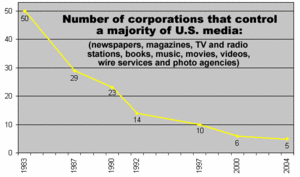Media consolidation
Overview

Media consolidation refers to an ongoing process in which more and more media companies (e.g. radio, television, newspapers, magazines) are falling into the hands of fewer and fewer owners.
These owners can then increasingly frame and direct the national discourse (or what passes for it, these days) in such a way as to control what a majority of voters believe. This gives them subtle but nonetheless enormous power to control the national mindset and government, by determining what issues get "airplay" (and how they are presented) and which candidates win elections.
It is primarily an issue in the United States, where there are no government-owned media companies to provide a voice that is not driven by any requirement to maximize profit or donations.
Related Issues
- The new webcasting rules in the United States will be another step towards media consolidation if not repealed, as only large companies can afford to operate internet radio stations under the new rules.
Links
Tagged
News
- 2014-05-14 [L..T] How Five American Companies Control What You Think «The explanation is surprisingly simple: There aren't numerous US mass media news sources at all; there are just five. Five giant corporations control 90 percent of US mass media. And direct links connect all five of these media conglomerates to the political establishment and the economic and political power-elites of the United States.»
Projects
- Media Consolidation at Free Press
Reference
- Wikipedia
Conservapedia: no information as of 2010-03-25
dKosopedia: no information as of 2010-03-25SourceWatch: no information as of 2010-03-25- Who Owns the Media?: interactive charts, research, reports, and some history